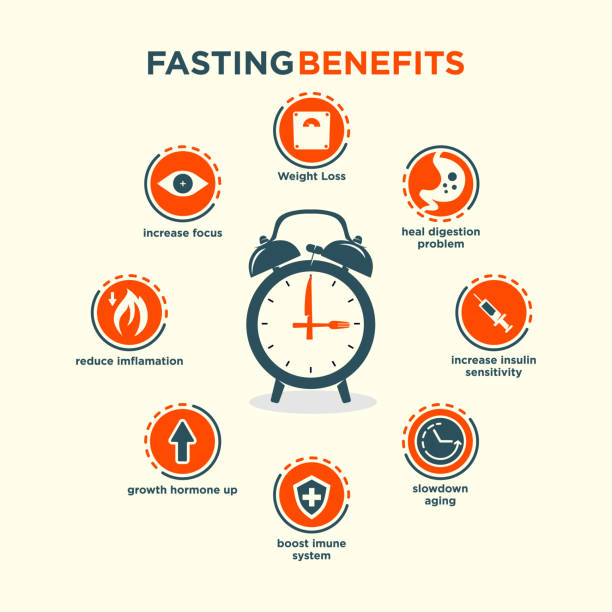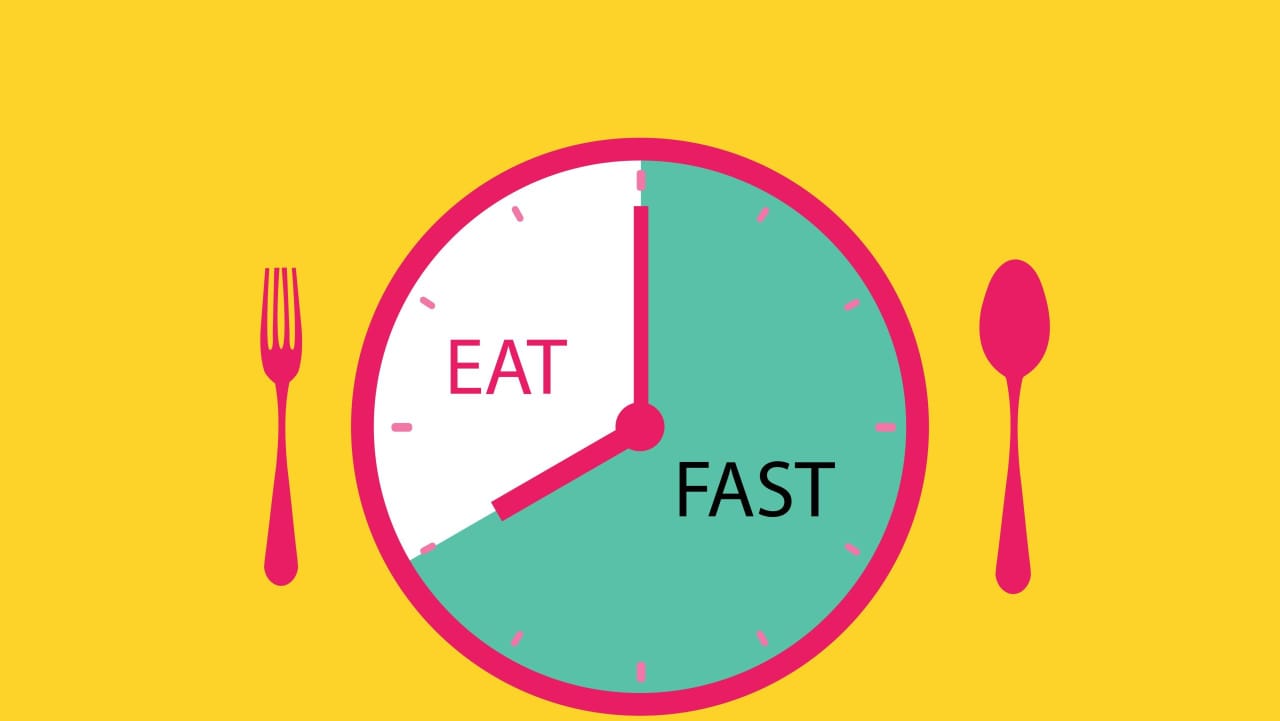Fasting : A Natural Way to Heal and Strengthen the Body
Fasting is not just a religious practice; it has many health benefits that help the body function better. When we fast, our body gets a chance to reset , detox and heal. Here are some key benefits of fasting.

1)Gives the Digestive System a Break
When we fast, our stomach and liver get time to rest, reducing the load on digestion. This help the body flush out toxins and improve gut health.
2)Helps in Weight Loss
Fasting helps the body burn stored fat for energy, which can lead to weight loss. It also boost metabolism, making digestion more efficient.
3)Improves Blood Sugar Levels
Fasting helps control insulin levels and reduces the risk of diabetes by balancing blood sugar levels. It also prevents sudden sugar spikes
4)Detoxifies the Body
When we fast, the body naturally removes toxins, cleanses the blood, and helps in better liver and kidney function.
5)Boost Brain Function and Focus
Fasting increases the production of brain boosting hormones, improving focus, memory, and mental clarity. It also reduces stress and anxiety
6) Increase Energy and Immunity
Since the body is not constantly digesting food, it can focus on repairing cells and strengthening the immune system. This helps fight diseases and infection.
7)Improves Heart Health
Fasting helps in reducing bad cholesterol, controlling blood pressure, and keeping the heart healthy .
Table of Contents
Fasting for 30 days in Ramadan brings amazing benefits
Ramadan is a special month of fasting, prayer, and self-discipline. From sunrise to sunset, people fast without food or water , which can sometimes make them feel tired or low on energy . That’s why eating the right foods and staying active in a smart way is important to stay healthy and energized throughout the month.

By choosing nutritious meals, drinking enough water and doing light exercise, you can keep your body strong and avoid common problems like weakness, dehydration , and digestive issues. In this blog, we’ll share simple and practical tips to help you maintain good health while fasting during Ramadan.
Why Nutrition is Important During Ramadan ?
During Ramadan, your eating and drinking patterns change because of fasting. Since your body goes without food and water for long hours, proper nutrition is essential to keep you healthy, energetic and focused.
Here’s why:
Provides Energy for the Whole Day
Fasting means your body relies on the food you eat during Suhoor and iftar for energy. Eating nutrient-rich foods like whole grains, proteins, and healthy fats helps you stay full and active throughout the day.
Prevents Dehydration
Since you can’t drink water during the day, it’s important to hydrate properly during suhoor and iftar . Drinking enough water and eating water-rich foods (like fruits and vegetables) prevents dehydration, headaches and fatigue.
Supports Digestion and Prevents Bloating
Eating too many fried or processed foods during iftar can cause bloating, acidity, and digestive problems. A balanced diet with fiber-rich foods, soups and fresh fruits helps keep digestion smooth.
Helps Maintain Muscle Strength
Long fasting hours can lead to muscle loss if you don’t eat enough protein. including chicken, fish, eggs, lentils, and dairy in your meals helps maintain muscle strength and recovery.
Boost Immunity and Overall Health
A well-balanced diet keeps your immune system strong, preventing fatigue and illness during Ramadan. Foods rich in vitamins, minerals, and antioxidations ( like nuts, seeds, and leafy greens) support overall health.
Improves Mental Focus and Mood
A lack of proper nutrition can make you fell tired, irritable, and unfocused. Eating complex carbs, healthy fats, and proteins helps maintain stable blood sugar levels, keeping your mind sharp and mood balanced.
Helps in Healthy Weight Management
Ramadan can be a great time to lose excess weight if you eat mindfully. Avoiding fried foods, sugary drinks and overeating helps in maintaining a healthy weight while fasting.
Foods to Eat and Avoid During Ramadan
Eating the right foods during Ramadan can help you stay energetic and hydrated throughout the day. Here’s a simple guide on what to eat and what to avoid.

Foods to Eat
✔ For Suhoor ( Pre- Dawn Meal):
- Whole grains like oats, brown rice, and whole wheat bread to keep you full longer.
- Protein-rich foods like eggs, yogurt, nuts, and beans for energy and muscle strength.
- Healthy Fats from avocados, olive oil, and nuts to keep you satisfied.
- fresh fruits and vegetables to keep your body hydrated and aid digestion.
- Plenty of water to prevent dehydration.
✔ For Iftar ( Breaking the Fast):
- Dates to give your body quick energy.
- Soups and light foods like lentil soup or salads to prepare your stomach for heavier meals
- Lean proteins like chicken, fish, or lentils for muscle recovery.
- Fruits like watermelon, oranges, and bananas for vitamins and hydration.
Foods to Avoid
❌ Fried and oily foods like samosas, pakoras, and fried chicken- they slow digestion and make you feel Tired.
❌ Sugary sweets like pastries and desserts- cause energy crashes and weight gain.
❌ Salty and processed foods like chips and pickles- they increase thirst
❌ Caffeinated Drinks like tea , coffee , and soda
Best Ways to Stay Hydrated During Ramadan
- Drink Enough Water – Aim for 8-10 glasses between Iftar and Suhoor.
- Eat Hydrating Foods – Include watermelon, cucumbers , oranges and yogurt.
- Avoid Dehydrating Drinks- Stay away from tea, coffee, and sugary sodas.
- Limit Salty & Spicy Foods– They increases thirst and cause dehydration.
- Break your fast with Water & Dates-It helps rehydrate and boost energy.
Staying hydrated keeps you energized and healthy throughout Ramadan!
Common Mistake to Avoid While Fasting in Ramadan
- Skipping Suhoor – Not eating Suhoor can lead to low energy and dehydration.
- Overeating at Iftar– Eating too much too fast can cause bloating and discomfort
- Drinking Less Water– Not hydrating properly can lead to headaches and fatigue
- Consuming Too Many Fried & Sugary Foods – Increase thirst, weight gain and Tiredness.
- Lack of Sleep- Poor sleep can make fasting harder and reduce energy levels
How to Stay Active and Fit During Ramadan
- Do Light Workouts- Walk, Stretch or do yoga after Iftar to stay active
- Stay Hydrated- Drink 8-10 glasses of water between Iftar and Suhoor.
- Eat Balanced Meals– Include Protein, fiber and healthy fats to maintain energy.
- Avoid Heavy & Fried Foods – They cause fatigue and Tiredness
- Get Enough Sleep- Aim for 6-8 hours of sleep to stay fresh
Healthy Recipes Ideas for Ramadan

To Stay Healthy, it’s important to eat nutritious food. Here are some healthy recipes for Suhoor and Iftar that will keep you fit and full of energy during Ramadan!
Suhoor ( Pre-Dawn Meal) Recipes:
- Oatmeal with Fruits & Nuts – Cook oats with milk or water, add bananas, almonds and honey
- Protein Smoothie – Blend milk, banana , dates , peanut butter and chia seeds.
- Chia Seed Pudding – Mix chia seeds with milk, let it soak overnight, and top with fruits .
- Greek Yogurt with Honey & Berries– A protein packed meal for sustained energy
- Egg & Avocado Toast– Whole wheat toast with mashed avocado and boiled eggs.
Iftar ( Breaking Fast) Recipes :
- Dates & Nut Energy Balls – Blend dates, almonds and coconut for healthy sweet snack.
- Lentil Soup– Light and nutritious, packed with protein and fiber
- Grilled Chicken with Quinoa Salad – A protein- rich and balanced meal.
- Vegetable & Chickpea Stir fry- A delicious and filling plant based dish
- Fruit Chaat ( Without sugar )- A refreshing mix of apples, pomegranates, and oranges with a squeeze of lemon
Ramadan is a time to take care of both your body and soul. Eating healthy, staying hydrated and avoiding overeating will keep you active and refreshed. Make smart foods choices and build habits that keep you healthy even after Ramadan.

